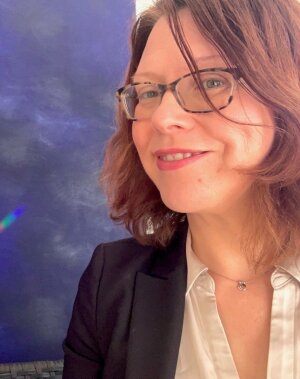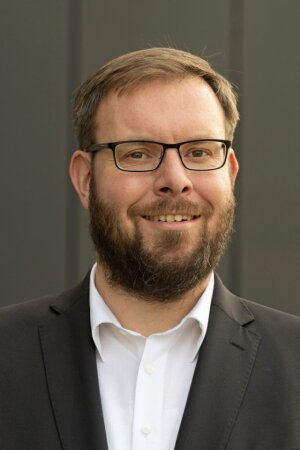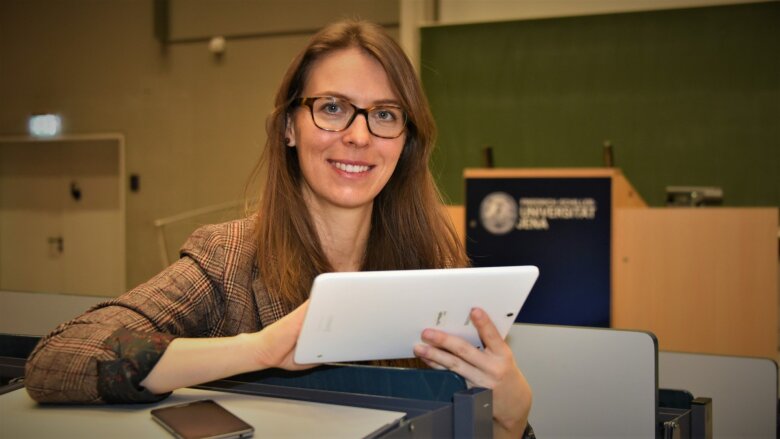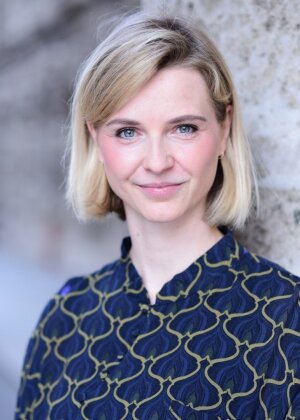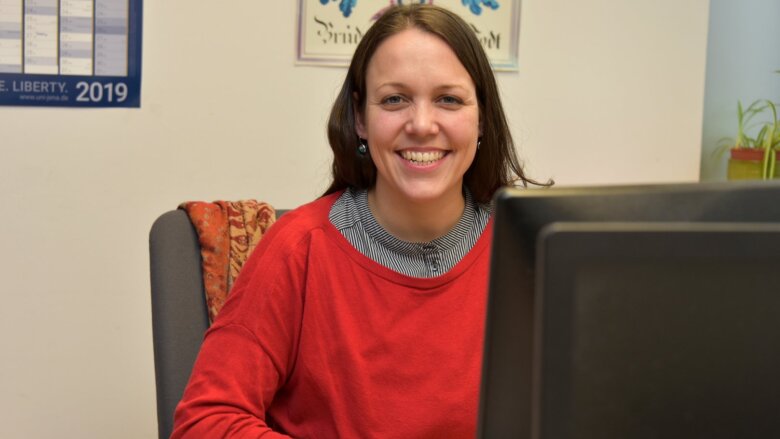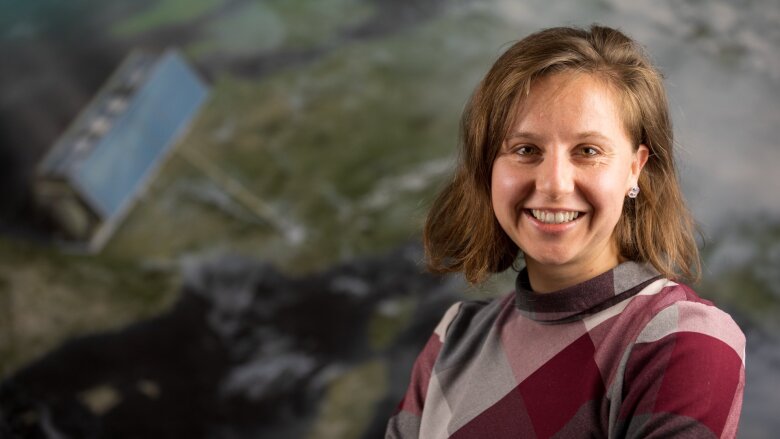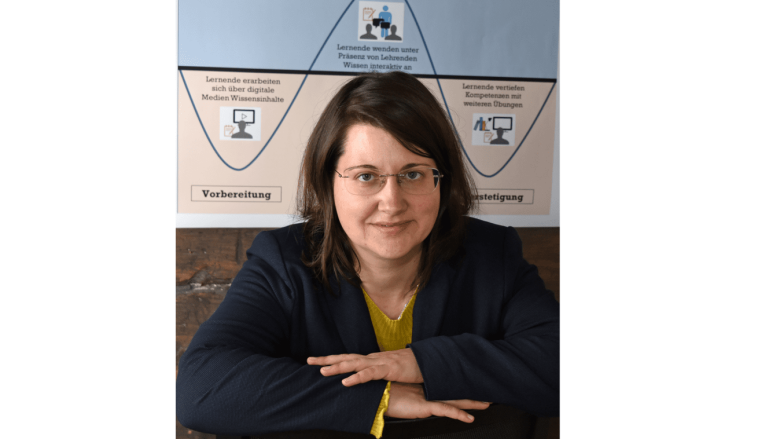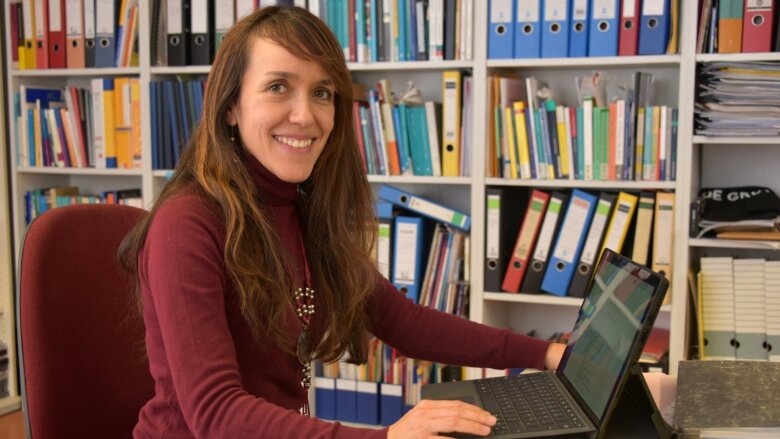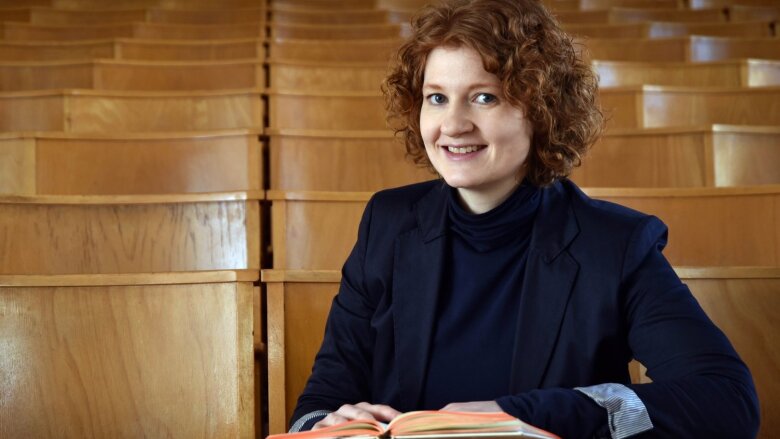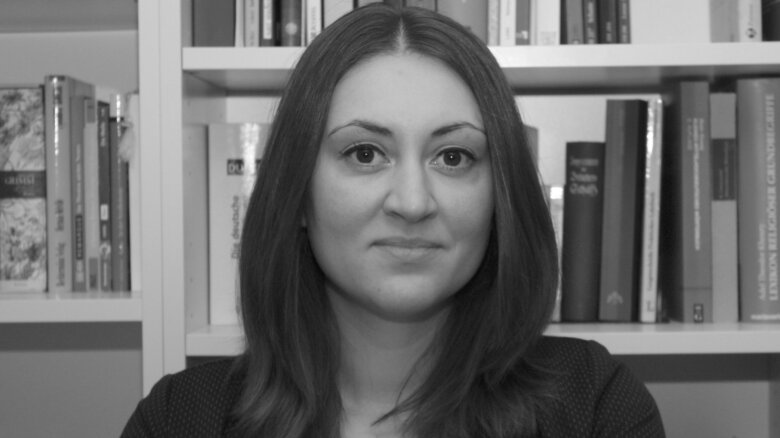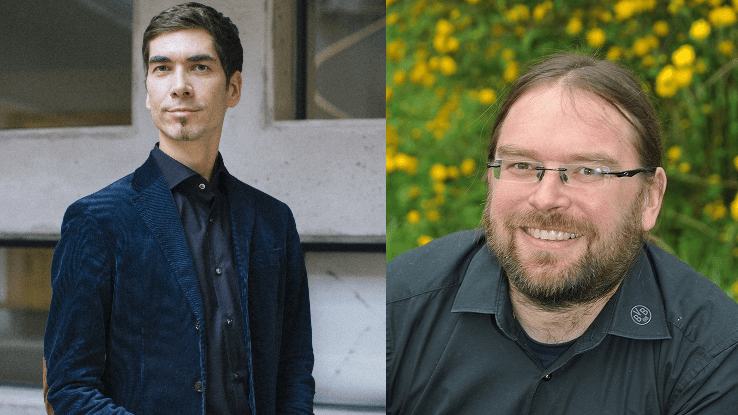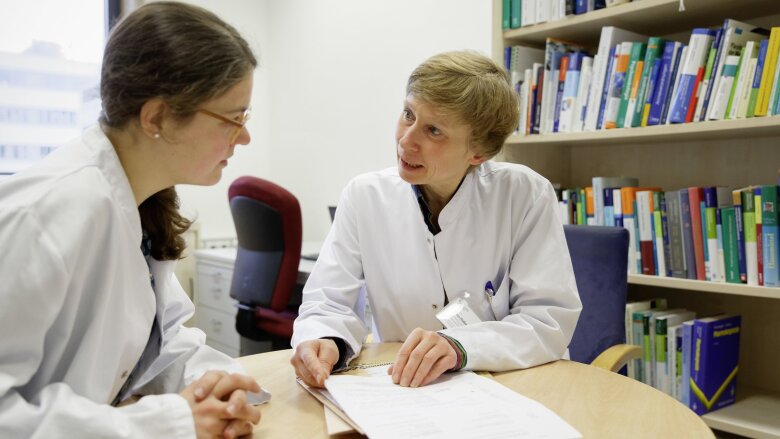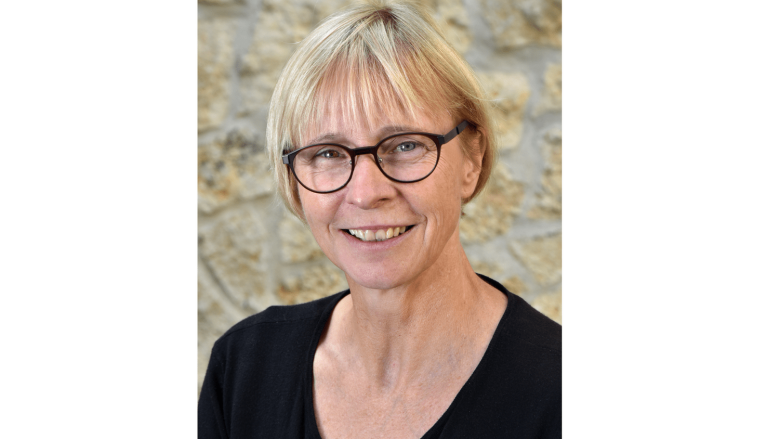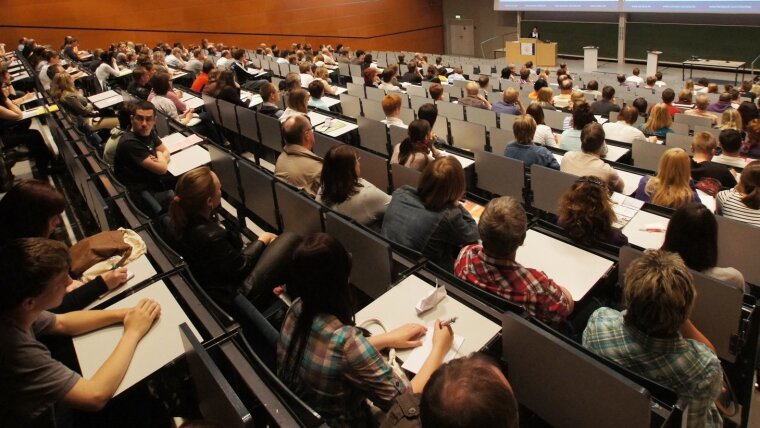
Teaching projects at Friedrich Schiller University are funded in the framework of the following external funding programmes:
Fellowships for innovation in digital academic teaching
As part of the Thuringian strategy for digitization in higher education, the Thuringian Ministry of Economics, Science and Digital Society, in cooperation with Stifterverband, has awarded eight Fellowships für Innovationen in der Digitalen Hochschullehre for the year 2021. Three of the fellowships, each endowed with up to 50,000 euros, were awarded to lecturers at Friedrich Schiller University Jena.
-
Dr Marcel A. Kamp and Dr Matthias A. Mäurer (2022): Digital student tumour conference in inverted classroom format
Project leaders: Dr Marcel A. Kamp (r.) and Dr Matthias A. Mäurer
Image: Michael Szábo/UKJModern treatments for cancer patients are only possible in interdisciplinary teams. In so-called tumour boards, examination findings from different disciplines are compiled and therapy recommendations are discussed together. Participation in such tumour conferences is not yet part of the curriculum in human medicine. Therefore, the physicians Dr Marcel A. Kamp and Dr Matthias A. Mäurer have developed the now funded project "Digitale studentische Tumorkonferenz im inverted classroom-Format". In addition to specialist knowledge, the participating students are to learn how a neuro-oncological tumour board works, effective communication, the creation of personalised therapy plans as well as the discussion and consideration of ethical aspects of medical action. The courses are designed in such a way that the students prepare themselves with online material and use the event for in-depth and interactive discussion of what they have learned.
-
Prof. Dr Miriam Rose (2022): Writing to learn. Digital writing-based teaching in systematic theology
Project leader: Prof. Dr Miriam Rose
Image: Andreas KuhnWriting is itself a means of learning, not just a way to produce texts. In this project, writing exercises will be used to encourage students to engage with theories independently, to develop their own position on them and to experience themselves as self-effective in their learning process.
In the background is the concept from American university didactics "writing to learn". Examples of such writing exercises are: 3 minute exercise "What interests you most about this text?", "Which topics from the lecture would you like to deal with further?" or "What was particularly important for you in today's seminar session?". With the help of digital tools, including Padlet, students can also collaborate anonymously, i.e. comment on a text together, write down examples or note references to other texts/theories. Many combinations of present and digital teaching, of asynchronous and synchronous teaching elements can be flexibly designed.
It has been experimentally proven that writing things down oneself makes learning more sustainable and that handwritten writing in particular reinforces independent acquisition.
The project is being developed for introductory courses in the field of systematic theology, but many transfer possibilities to the cultural and social sciences and beyond are envisaged.
-
Dr Thomas Kaiser (2022): Understanding with a second glance: The Digital Repository for Mathematical Methods
Project leader: Dr Thomas Kaiser
Image: Jens Meyer (University of Jena)"Verständnis mit dem zweiten Blick: Das digitale Repositorium für Mathematische Methoden" is the name of the funded project by physicist Dr Thomas Kaiser. He wants to develop a teaching-learning format to improve the introductory phase of studies in the STEM subjects. To this end, the start of studies is to be equalised in terms of time, attendance phases are to be used more optimally and students are to be networked more early on. And in order to consolidate early subject knowledge, the contents are to be taken up again and deepened in later semesters. Dr Kaiser wants to achieve these goals by using open-source digital methods to analyse learning.
-
Theres Werner (2021): Learning digital teaching in German as a foreign and second language
Project leader: Theres Werner
Image: Anne Günther (University of Jena)The project Digitales Lehren lernen in Deutsch als Fremd- und Zweitsprache (Learning digital teaching in German as a foreign and second language, DiLele DaF/DaZ) by Theres Werner was awarded a Fellowship für Innovationen in der Digitalen Hochschullehre Thüringen announced by Stifterverband and funded by the Thuringian Ministry of Economics, Science and Digital Society. The DiLele DaF/DaZ project addresses the current situation of distance learning with the aim of integrating this form of teaching/learning into teacher training curricula and systematically developing it further. The situation since March 2020 has made it increasingly clear that ‘digital competence [...] is a key competence of the 21st century’ (DigCompEdu 2017: 1). Academic teaching had to be converted to digital formats in a very short time without any prior testing and evaluation of these teaching-learning settings. The same applies to the school context. This is where teaching innovation comes in. In a course, students in teacher training try out different formats of digital teaching and learning in a protected space according to their prior knowledge and reflect on the advantages and disadvantages. Digital learning is not only a learning content, but also a learning method and learning product. The aim is to prepare the prospective teachers for their everyday teaching in a practical way.
Literature
DigCompEdu (2017): Broschüre zur digitalen Kompetenz Lehrender. https://www.pedocs.de/frontdoor.php?source_opus=23096External link (as at 11.12.2020). -
Prof. Dr Gerhard G. Paulus (2021): Hybrid teaching of smaller courses using the example of the lecture ‘Physikalische Grundlagen Erneuerbarer Energien’
Professor Paulus explains Maxwell's equations to a curious SteadyCam using many experiments.
Image: Simon Stützer, Fa. Boulder-BundesligaThe aim of the project is to combine classroom and digital teaching for smaller lectures—hybrid teaching. For this purpose and supported by external expertise, a mobile system is to be procured, configured and programmed, which maximizes immersion, communication, and interaction. Originally designed for teaching under corona conditions, the students attending the course digitally will be enabled to participate in a way comparable to the students present through excellent image and sound quality, different image settings (‘scenes’), and interactive elements. At the same time, the advantages of digital teaching, such as permanent retrievability, are retained. The technology should be mobile, inexpensive to operate and easy to use in order to enable widespread use. After test and optimization runs in the summer semester 2021, the system is to be demonstrated with a public livestream in the winter semester using the lecture ‘Physikalische Grundlagen Erneuerbarer Energien’.
-
Dr Franziska Greiner (2021): Digital Casebooks. Case-based self-learning environments to promote transfer from theory to practice in teacher training programmes
Project leader: Dr Franziska Greiner
Image: Dr. Franziska GreinerTheoretical knowledge transfer still dominates in university teaching. This is particularly at odds with the strong vocational orientation of students in teacher training. In educational science teaching, questions such as ‘What do I do if ... happens?’ are often met with the answer that there is no blanket way, but that it is necessary to consider the individual case. The aim of the teaching innovation is therefore to strengthen the link between theory and practice. To this end, digital casebooks are being developed in which theoretical knowledge is to be applied to practical school issues based on a concrete case study. In order to take greater account of the heterogeneity of the students, the digital casebooks will be designed to be multimodal, interactive and accessible using digital technologies. Another focus will be on supporting self-regulated learning. After testing the digital casebooks on three topics relevant to teaching practice, the teaching innovation is to be made usable for other disciplines within and outside of teacher training.
-
Diana DiMaria (2020): E-portfolio as an examination format running in parallel with the course
Project leader: Diana DiMaria
Image: Anne Günther (University of Jena)The project E-Portfolio als studienbegleitendes Prüfungsformat is an up-to-date approach combining the content-related challenges of studies and research in the humanities in the modern world, in which excellent applicants for Master's programmes—as well as their teachers—(want and have to) act internationally, digitally competent and thus less dependent on a specific location, with a study programme concept that wants to be practical, interdisciplinary, and prepare for a career.
The project is to be used as a pilot project in the newly created Master's programme ‘Literary Translation’ and, if successful, will subsequently be presented to other (especially interdisciplinary, international and practice-oriented) Master's programmes as a model for possible integration into other curricula.
-
Dr Ing. Clémence Dubois (2020): Blended learning in the field of Earth observation
Project leader: Dr Clémence Dubois
Image: Robert EckardtThe funded project serves both to optimize the didactic interplay of digital teaching content and face-to-face events and to actively involve students in the design of new digital teaching content for the next generations of students.
Specifically, this project is used in the context of a module attended by students with different levels of prior knowledge. In order to take into account the heterogeneous knowledge base of the students, material from a Massive Open Online Course (MOOC) is already being used in parallel with the course, which covers the necessary basics and further information for the topics addressed in the module. However, the heterogeneous prior knowledge can only be mitigated to a limited extent by the MOOC content due to the different learning rhythms of the students.
Within the framework of the fellowship, a blended learning model is to be designed and implemented, which aims at the focused integration of e-learning content of the MOOC and the face-to-face events. In addition, a further deepening of what has been learned is to take place through active co-creation of new digital content. After testing, this concept is to be further expanded in order to use the newly created digital content as an additional learning basis for the next generations of students.
-
Dr Dana Schneider (2020): Digital Flipped Classroom Psychology
Project leader: Dr Dana Schneider
Image: Anne Günther (University of Jena)In the Bachelor's programme in Psychology at Friedrich Schiller University Jena, the social psychology module ‘B-PSY-106’ is to be redesigned with regard to digitization and didactics. The fact that certain contents can be standardized at high level, while the students are individual students are good reasons for the increased use of digital tools. Thus, a digital Flipped Classroom is to be designed and implemented within the framework of the fellowship.
The use of teaching innovation pursues a range of goals, the most important being that
- several hundred students of the basic subject of social psychology acquire deep and lasting knowledge,
- key psychological competencies in perception, thinking and action processes are better developed and trained, and
- students of psychology are more adequately prepared for the living and working world 4.0.
The concept is to be evaluated, improved and adapted accordingly during the term of the fellowship. At the end of the project, the innovation should be transferable to other modules of the psychology study programme, especially the basic subjects such as developmental, perceptual or personality psychology.
-
Dr Diana Vesga (2020): Media competence in Romance teacher training right from the start
Project leader: Dr Diana Vesga
Image: Anne Günther (University of Jena)Digitization is increasingly shaping our everyday lives and changing education. The fact that digital teaching and learning settings open up new possibilities for enriching, flexibilizing and individualizing learning processes is now undisputed in educational policy discourse. Therefore, all educational institutions are nowadays tasked with developing and implementing digitally supported learning formats.
However, in teacher training, the digitization of education brings new challenges that go far beyond the mere integration of digital media into university teaching.
Prospective schoolteachers need to acquire specific competences in order to find their way in an increasingly digitalized school landscape.
This project aims to formulate these necessary competences and make them an essential part of the subject-didactic curriculum in the Romance Studies teacher training programme.
-
Dr Julia Dietrich (2019): Heterogeneity-oriented teacher training through digitalization: Development of differentiation matrices, DigitDiffM
Dr. Julia Dietrich
Image: Anne Günther (University of Jena)A student body that is heterogeneous in terms of performance and motivation has so far mainly been confronted with learning settings for homogeneous groups (‘one-size-fits-all’). However, heterogeneity-oriented programmes are better suited to ensure learning success for all. The challenges posed by heterogeneous student groups can be addressed with digital teaching-learning offerings. Digital differentiation matrices in particular are a didactic approach for heterogeneity-sensitive teaching. In the planned project, differentiation matrices for teacher training are to be developed. These contain content that is complex to varying degrees. They can be worked on in a digital tool throughout the entire teacher training programme, whereby certain minimum standards are to be achieved. The learning speed and the way in which students achieve these standards may explicitly vary. After a trial period, the digital tool is to be made widely usable in five areas of teacher education.
Contact person:
Dr. Julia Dietrich
Email: julia.dietrich@uni-jena.de
Phone: +49 3641 945347 -
Jennifer Koch (2019): Propaedeutic course Middle High German, ProMihD
Jennifer Koch
Image: Jennifer KochIn the subject of ‘Older German Literature’ at Friedrich Schiller University Jena, students have a very heterogeneous and low level of knowledge. In the introductory seminars of the compulsory module ‘Older German Literature I’, the lecturers of the department try to counter this problem and therefore impart knowledge of literature and linguistics. However, the students' increase in knowledge is very small, as the time for teaching Middle High German language competence in the module's seminars is very limited.
I would like to address this problem with the MOOC ProMihD—an online preparatory course in which students acquire a basic knowledge of Middle High German and its indexing in 3 weeks during the semester break.
The respective seminars in ‘Older German Literature I’ build on this knowledge and apply it to the respective seminar subject, thus consolidating and expanding it. The course is to become an integral part of the module.
Contact person:
Jennifer Koch
Email: jennifer.koch@uni-jena.de
Phone: +49 3641 944205
Curricula of the future
Friedrich Schiller University Jena receives funding as part of the Curricula der Zukunftprogramme. In the framework of the Thuringian strategy for digitization in higher education, the Thuringian Ministry of Economics, Science and Digital Society (TMWWDG) supports innovative study content from its strategy and innovation budget. The three teaching projects funded at the University of Jena are:
-
Digital Professionalization in Teacher Training (DIKoKo)
Learn moreExternal linkdelinks: Prof. Dr. Alexander Gröschner, rechts: Prof. Dr. Nils Berkemeyer
Image: Anne Günther (University of Jena)Teacher training plays a central role in higher education, since well-qualified teachers play a key role in discovering and promoting young talent in the school sector.
Since its modularization and reform in 2009, teacher training at the University of Jena has established itself in Thuringia and is now also known throughout Germany—especially for its early implementation of a practical semester.
The aim of the project Digitale Professionalisierung im Lehramtsstudium – Individuell. Kollaborativ. Kompetenzorientiert (Digital Professionalization in Teacher Training—Individual. Collaborative. Competence-Oriented, DIKoKo) is to support the reformed accompanying study programme in educational science in the winter semester 2018/19 with a digitization strategy.
The aim is to provide innovative digital teaching/learning formats designed from a perspective of higher education didactics for the evidence-based and professionally oriented study content.
The core of the project is to integrate digital tools for teaching and learning into the corresponding modules in a targeted manner in order to prepare the future teachers for the changed conditions and digital challenges of everyday professional life already during their studies.
The aim of the project is to provide all students in teacher training programmes (grammar school and regular school teaching profession) with opportunities to acquire their knowledge and skills by means of blended learning and online courses in different event formats in the course of their studies—in addition to the previously exclusively classroom-based courses. The flipped classroom approach is used in particular in the introductory study phase; task processing and reflection phases (by means of an online platform) are to support the sustainable acquisition of knowledge. What makes the approach unique for a teacher training programme at a university in Germany covering all disciplines is the use of peer- and team-teaching oriented video feedback (Gröschner et al., 2018). Here, micro-teaching is used to test professional learning opportunities for teaching—in a theory-based, action-oriented way that promotes reflection on the topic of classroom communication.
The experiences of the practical training come to bear in seminar forms, in which certain topics—based on interests—are deepened by means of individual and collaborative activities.
Parallel to the DIKoKo project—from January 2019—further (digitally supported) learning opportunities for teacher training and schools of the future will be offered in the newly founded ‘Learning to Teach-Lab: Science (LTL:S)’ at the Institute of Educational Science (headed by Prof. Dr Alexander Gröschner)
More information at: https://www.teach.uni-jena.de/enExternal link
Contact persons:
Prof. Dr. Alexander Gröschner
Email: alexander.groeschner@uni-jena.de
Phone: +49 3641 945350Prof. Dr. Nils Berkemeyer
Email: nils.berkemeyer@uni-jena.de
Phone: +49 3641 945360 -
EHealth and Communication
rechts: Prof. Dr. Jutta Hübner
Image: UKJ/SkollIncreasing networking and complexity in research and patient care requires better information flow, better data exchange, and communication that is more intensive. This happens within one's own professional group, but—crucially—with laypersons (population, patients and relatives, media). An increasing part of this exchange takes place in electronic media. In addition to high potentials, this development is also characterized by risks and barriers (inequality between generations (digital visitors vs. digital natives), (e)health literacy depending on the level of education, data protection, and ethical considerations, e.g. on Quantified Self).
Today, doctors are already faced with informed patients who have obtained a large part of their information but also of their questions from web-based offers (about which the doctor often knows little or nothing). This new development is both an opportunity and a risk. Opportunity, because patients can prepare for or follow up on the conversation with the doctor. Risk, because many web-based information offers are inadequate, poor and can sometimes even cause considerable harm with (conscious or unconscious) misinformation. In social networks, there is an increasing distrust of doctors, academic and evidence-based medicine, so that the patient-doctor relationship is strained.
Communicating research ideas and research results to laypersons (which also includes decision-makers in politics and society) will become very important for research in the future. This means that comprehensible communication about highly complex interrelationships will also be necessary under the rules of modern media.
Objectives of the project
The aim of the project is to develop an interdisciplinary Master's programme ‘eHealth’ at Friedrich Schiller University Jena for graduates of medicine, dentistry, nutritional sciences, nursing sciences or psychology and other academic professional groups active in health care. The focus of the study programme is on the integration of eHealth in information transfer and communication. This continuing education programme should also appeal to graduates from other universities and universities of applied sciences, thus becoming a model degree programme throughout Germany. The Master's programme is divided into attendance phases and phases of digital learning close to home. It can be completed while working.
Participating disciplines and experts
- Medicine and Dentistry
- Nutritional sciences
- Psychology
- Nursing and Nursing sciences
- Informatics
- Medical informatics
- Communication sciences
- Medical journalists, bloggers; manufacturers and users of eHealth offerings
- Patient representatives, especially with activities in (social) media
- Close contact with experts from the field, especially during internships and master's theses
Contact person:
Prof. Dr. Jutta Hübner
Email: jutta.huebner@med.uni-jena.de
Phone: +49 3641-9324256 -
Inter-university teaching in the context of heterogeneity-sensitive teacher education
Learn moreExternal linkdeProf. Dr. Bärbel Kracke
Image: Anne Günther (University of Jena)The aim of the cooperation project is to anchor the topic ‘Dealing with inclusion in the school context’ in a jointly developed curriculum at the two teacher training universities Friedrich Schiller University Jena and the University of Erfurt (UE).
Societal and educational policy developments require that future teachers be sensitized to heterogeneity and—in particular—inclusion, more intensively and systematically than before, and that they be prepared to deal productively and without prejudice with the associated challenges (e.g. cooperation in multiprofessional teams of regular teachers and support teachers, target-differentiated teaching) (KMK, 2015).
As part of the Qualitätsoffensive Lehrerbildung (Teacher Training Quality Campaign) programme funded by the Federal Ministry of Education and Research (BMBF), the universities of Jena and Erfurt have been working on the comprehensive field of inclusion in various formats since 2015. In the pilot project, the expertise developed here is to be systematized reciprocally and sustainably for teacher training at both locations with the help of a digital online platform, digitally processed, and further developed with regard to transferability to other study programmes.
Based on a joint curriculum derived at the beginning of the project work from the ‘Guiding principles for an inclusion-oriented, cross-phase and phase-networking teacher education in Thuringia’ (Leitgedanken für eine inklusionsorientierte, phasenübergreifende und phasenvernetzende Lehrerbildung in Thüringen, published in 2018 by the Thüringer Beirat für Inklusion), two central goals are to be pursued in the cooperation project:
- identification and digital translation of existing curricular building blocks at both universities and
- co-constructive development of a model joint event offer.
All developed elements will be made available on a Moodle-based learning platform, the ‘Glocal Campus’, to be used free of charge by both universities.
Contact person:
Prof. Dr. Bärbel Kracke
Email: baerbel.kracke@uni-jena.de
Phone: +49 3641 945341
